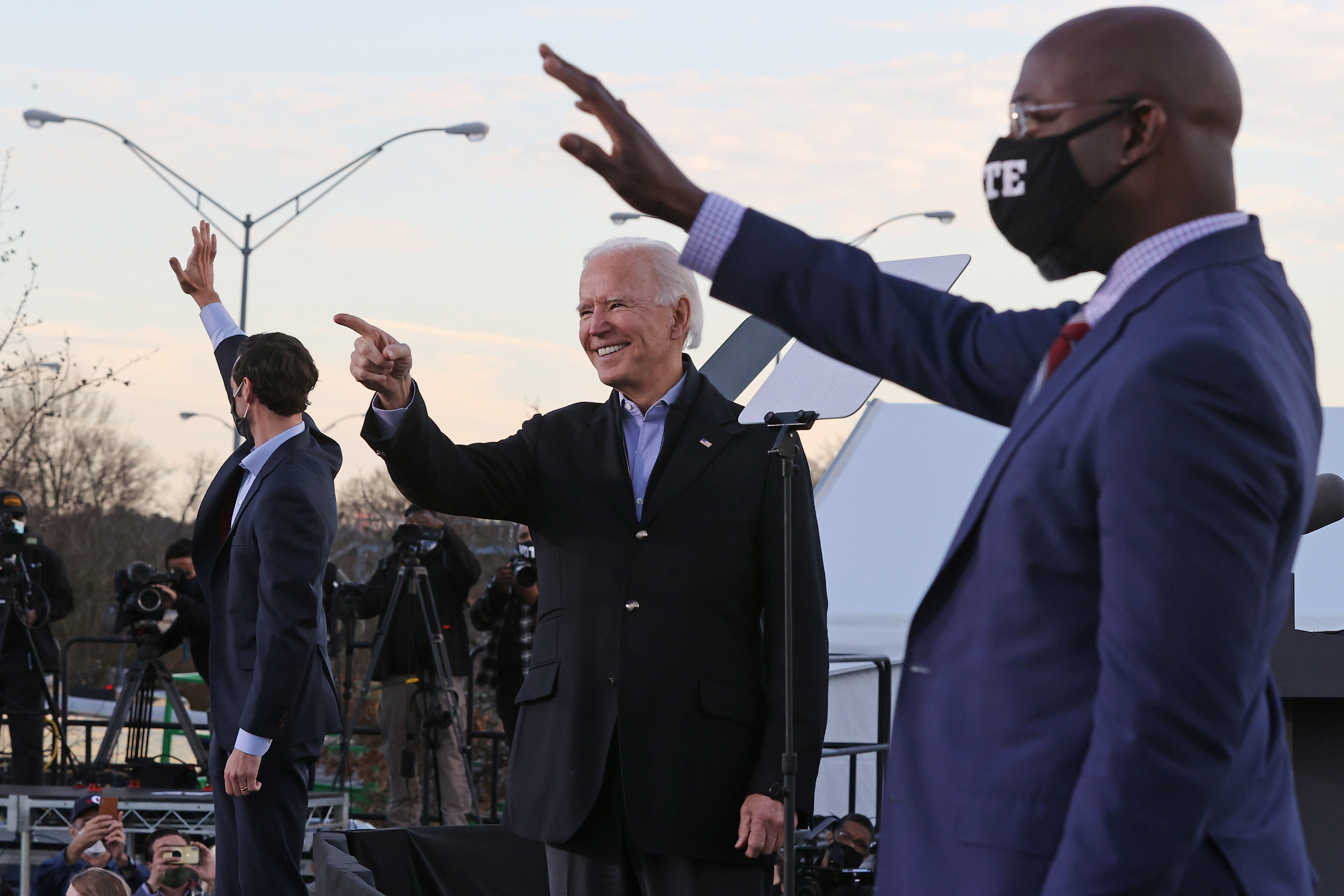
Wins for Jon Ossoff (R) and Rev. Raphael Warnock (L) in Georgia's Senate runoffs are a major boost for President-elect Joe Biden's (C) agenda. /CGTN
Wins for Jon Ossoff (R) and Rev. Raphael Warnock (L) in Georgia's Senate runoffs are a major boost for President-elect Joe Biden's (C) agenda. /CGTN
Georgia has elected its first Democrats to the U.S. Senate since 1996, a huge boost for incoming president Joe Biden whose party will control both house of Congress as well as the White House.
Here are five consequences of Raphael Warnock and Jon Ossoff's victories over Kelly Loeffler and David Perdue in Tuesday's runoff elections.
1. A Democratic trifecta
The Democratic history-making (see below) victories transform the prospects for the Biden presidency, and reframe the party's success in the November 3 elections: the party now holds a trifecta.
A 50-50 tie in the Senate with Vice President-elect Kamala Harris holding the casting vote doesn't give the Democrats free reign, but it will certainly make appointments—Biden has now indicated he plans to name Merrick Garland as attorney general—a simpler process and may mean swift action on $2,000 COVID-19 relief checks.

Wins for Jon Ossoff (L) and Rev. Raphael Warnock (R) in Georgia's Senate runoffs are a major boost for President-elect Joe Biden's (C) agenda. /Getty
Wins for Jon Ossoff (L) and Rev. Raphael Warnock (R) in Georgia's Senate runoffs are a major boost for President-elect Joe Biden's (C) agenda. /Getty
Ultimately, the 2020 election cycle went a lot better for Democrats than it seemed in the aftermath of November 3, when there was disappointment over a series of losses in battlegrounds and Senate control looked a long shot.
The party didn't win landslides, but has eked out enough narrow victories to take control of the White House and both houses of Congress.
2. … but no guarantees for Biden
The tight margins mean Biden's more radical reform plans will have to be scaled back. Issues like statehood for Puerto Rico or Washington, D.C. and expanding the Supreme Court are almost certainly staying on the shelf, but healthcare expansion, infrastructure building, judicial reform and climate change policies are realistic.
There are several centrist Democrats who don't sign up to the more progressive agenda pushed by senators like Bernie Sanders, so moderate legislation from the White House is inevitable: this may also improve Biden's chances of peeling off Republican support. That's not to say Biden won't feel pressure from the left though.

Centrist Democrat Joe Manchin will have a influential role in the new Senate. /Getty
Centrist Democrat Joe Manchin will have a influential role in the new Senate. /Getty
It will also put Harris in the high profile position of casting deciding votes, and could be good news for moderates on both sides of the aisle: Republicans senators like Susan Collins and Lisa Murkowski alongside Democrat Joe Manchin will likely wield substantial leverage.
Historically, single-party control of Congress and the White House comes with a sting in the tail in the following midterm elections—so Biden has little over 18 months to take full advantage.
3. Trump's influence is complicated
Donald Trump continues to drive emotions on both sides of the political aisle, but his actions in recent weeks—particularly trying to delegitimize the voting system while telling people to vote—appear to have done the Republicans more harm than good. There's little doubt that he will be blamed by many for the losses in Georgia.
Turnout in some areas that voted strongly for the president in 2020 was down in the runoffs, suggesting people who backed Trump didn't come through for his party's candidates. There was also strong showing from Democrats: a leap in people who voted early who didn't vote at all in 2016 as well as a big jump in Black turnout.

Trump supporters gather outside the Capitol building in Washington, D.C., U.S., January 6, 2021. /Getty
Trump supporters gather outside the Capitol building in Washington, D.C., U.S., January 6, 2021. /Getty
Overall, with Congress set to ratify Biden's win on Wednesday, the Republicans divided and the Democrats in control of the Senate, Trump's influence in the country and his party is steadily weakening.
But as Wednesday's events in Washington show, he still has a committed, if waning, band of supporters.
4. History-making results
Warnock is the first Black person Georgia has elected to the Senate and first Black Democrat to ever be elected in the south, as well as the second African American voted into the Senate from the Deep South since the Reconstruction era.
Ossoff is the first Jewish person Georgia has sent to the Senate, and at 33 the youngest elected senator since a certain Joe Biden won in Delaware almost 50 years ago. He and Warnock, who essentially ran on a joint ticket, also became the first Democrats to win a Senate election in Georgia since Max Cleland in 1996.

Jon Ossoff (L) and Raphael Warnock make history with their victories in Georgia's Senate runoff elections. /Getty
Jon Ossoff (L) and Raphael Warnock make history with their victories in Georgia's Senate runoff elections. /Getty
Victory for Warnock, the pastor at Ebenezer Baptist Church, was also a win for the religious left—a group that has been outshone by the religious right in recent years—and was propelled by a big increase in Black turnout.
Turnout was extraordinarily high for a runoff election, topping 4.3 million—double the number of votes cast in any of the state's previous runoffs and higher than the regular election in 2016.
5. McConnell out of a job
Mitch McConnell has been among the most powerful players in Washington for the past six years, but the results in Georgia mean he will lose his cherished position as Senate majority leader.
Love him or loathe him, the Kentucky senator has had a huge influence on American public life and his single-minded pursuit of appointing conservative justices will have a bearing on the country for decades to come.

Senate Majority Leader Mitch McConnell (L) and Senate Minority Leader Chuck Schumer (R) stand back to back during a joint session of Congress, Washington, D.C., January 6, 2021.
Senate Majority Leader Mitch McConnell (L) and Senate Minority Leader Chuck Schumer (R) stand back to back during a joint session of Congress, Washington, D.C., January 6, 2021.
McConnell may yet extend his 14-year stint at the helm of Senate Republicans, but he will lose his power: a dramatic shift. Over the past six years he has stopped bills going to the floor that would have been supported by fellow Republicans, thwarted Democratic aims at every turn and dominated the agenda of the Senate.
Quite how the parties will operate in a tied Congress will have to be hammered out, but Democratic Senator Chuck Schumer is set to become the majority leader and committee chairmanships could be split, likely sidelining Republican firebrands.

